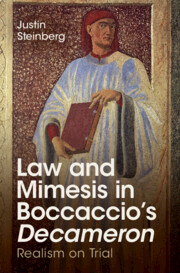38 results
The Cambridge Spinoza Lexicon
- Coming soon
-
- Expected online publication date:
- December 2024
- Print publication:
- 31 December 2024
-
- Book
- Export citation
Chapter 2 - The Artist and the Police
-
- Book:
- Law and Mimesis in Boccaccio's Decameron
- Published online:
- 07 August 2023
- Print publication:
- 01 June 2023, pp 60-83
-
- Chapter
- Export citation
Acknowledgments
-
- Book:
- Law and Mimesis in Boccaccio's Decameron
- Published online:
- 07 August 2023
- Print publication:
- 01 June 2023, pp vi-viii
-
- Chapter
- Export citation
Chapter 3 - The Widow and the Sovereign
-
- Book:
- Law and Mimesis in Boccaccio's Decameron
- Published online:
- 07 August 2023
- Print publication:
- 01 June 2023, pp 84-110
-
- Chapter
- Export citation
Contents
-
- Book:
- Law and Mimesis in Boccaccio's Decameron
- Published online:
- 07 August 2023
- Print publication:
- 01 June 2023, pp v-v
-
- Chapter
- Export citation
Bibliography
-
- Book:
- Law and Mimesis in Boccaccio's Decameron
- Published online:
- 07 August 2023
- Print publication:
- 01 June 2023, pp 219-240
-
- Chapter
- Export citation
Copyright page
-
- Book:
- Law and Mimesis in Boccaccio's Decameron
- Published online:
- 07 August 2023
- Print publication:
- 01 June 2023, pp iv-iv
-
- Chapter
- Export citation

Law and Mimesis in Boccaccio's Decameron
- Realism on Trial
-
- Published online:
- 07 August 2023
- Print publication:
- 01 June 2023
Chapter 6 - The Author on Trial
-
- Book:
- Law and Mimesis in Boccaccio's Decameron
- Published online:
- 07 August 2023
- Print publication:
- 01 June 2023, pp 192-218
-
- Chapter
- Export citation
Chapter 5 - Another Way of Possessing
-
- Book:
- Law and Mimesis in Boccaccio's Decameron
- Published online:
- 07 August 2023
- Print publication:
- 01 June 2023, pp 151-191
-
- Chapter
- Export citation
Index
-
- Book:
- Law and Mimesis in Boccaccio's Decameron
- Published online:
- 07 August 2023
- Print publication:
- 01 June 2023, pp 241-245
-
- Chapter
- Export citation
Introduction
-
- Book:
- Law and Mimesis in Boccaccio's Decameron
- Published online:
- 07 August 2023
- Print publication:
- 01 June 2023, pp 1-30
-
- Chapter
- Export citation
Chapter 1 - The Novella on Trial
-
- Book:
- Law and Mimesis in Boccaccio's Decameron
- Published online:
- 07 August 2023
- Print publication:
- 01 June 2023, pp 31-59
-
- Chapter
- Export citation
Chapter 4 - Torture and the Sense of an Ending
-
- Book:
- Law and Mimesis in Boccaccio's Decameron
- Published online:
- 07 August 2023
- Print publication:
- 01 June 2023, pp 111-150
-
- Chapter
- Export citation
Dedication
-
- Book:
- Spinoza's Political Psychology
- Published online:
- 31 October 2018
- Print publication:
- 01 November 2018, pp v-vi
-
- Chapter
- Export citation
4 - The Politics of Hope and Fear
-
- Book:
- Spinoza's Political Psychology
- Published online:
- 31 October 2018
- Print publication:
- 01 November 2018, pp 80-100
-
- Chapter
- Export citation
Figures and Tables
-
- Book:
- Spinoza's Political Psychology
- Published online:
- 31 October 2018
- Print publication:
- 01 November 2018, pp ix-x
-
- Chapter
- Export citation
1 - Metaphysical Psychology and Ingenia Formation
-
- Book:
- Spinoza's Political Psychology
- Published online:
- 31 October 2018
- Print publication:
- 01 November 2018, pp 12-37
-
- Chapter
- Export citation
7 - The Affective and Epistemic Cases for Democracy
-
- Book:
- Spinoza's Political Psychology
- Published online:
- 31 October 2018
- Print publication:
- 01 November 2018, pp 163-189
-
- Chapter
- Export citation
References
-
- Book:
- Spinoza's Political Psychology
- Published online:
- 31 October 2018
- Print publication:
- 01 November 2018, pp 217-230
-
- Chapter
- Export citation



